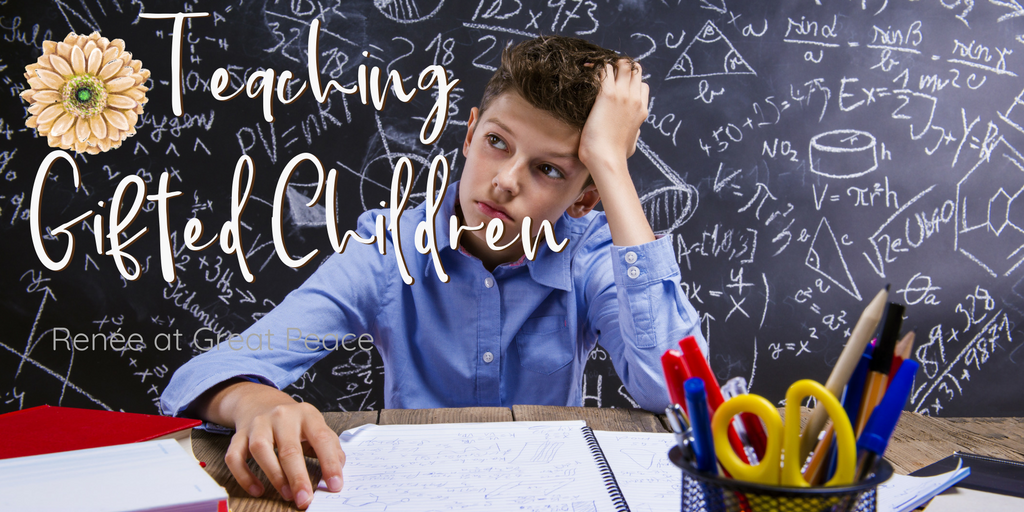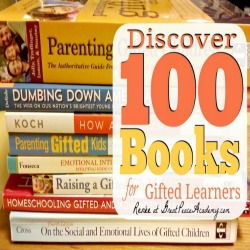
100 Must Read Things for Parents of Gifted Children to Read
Being a parent to a gifted child is in itself a gift. Although, there will be many days when we’ll think it’s the opposite. Parenting a gifted child comes with great joys as well as extreme frustrations. Often we are tested in our role as parents. On the one hand we become, seemingly the only advocate for our own children. On the other hand, we struggle to manage the day to day need to fill our child’s mind like we’d fill their stomachs.
Knowing how to find a balance between letting them soar, and letting them be children at the same time isn’t an easy task. In fact, it can be very hard Gifted Homeschooling and the Need for More.
This post contains affiliate advertisement links.

One of the biggest things I’ve learned over the years is that though I often feel alone in parenting my gifted child, the reality is, I am not. Throughout the world and within our own communities, there are other parents going through similar struggles as they are teaching and training up their children.
We need to look… but we can find help, comfort, and resources to help us as we help our children to develop their skills toward being productive, self-supporting, contributors to their own families, communities and careers as adults.
I’ve gathered for you 100 Must-Read Things for you to read. These are some of my favorite articles, resources and tips that have helped me, encouraged me, or taught me how to work with my own child. I hope you find them helpful to you as well.
Gifted Definitions
Gifted, is a hard term to clearly define. Many believe it’s an elitist term used to set apart a sub-set of the population that identifies them as, perhaps, better than others. But — this couldn’t be farther from the truth! The term gifted, when used in the context of education and psychology is a diagnostic term used to identify individuals who have advanced levels of cognition in one or more areas of mental, or creative functionality. At least, that is the best way I personally can describe it.
But, I’m no expert! Instead, I’ll let the experts define the term gifted for you.
Giftedness Defined at The National Society for the Gifted and Talented
“Children and youth with outstanding talent who perform or show the potential for performing at remarkably high levels of accomplishment when compared with others of their age, experience, or environment.”
– US Department of Education, 1993
What is Giftedness? at The National Association for Gifted Children (NAGC)
“Children are gifted when their ability is significantly above the norm for their age. Giftedness may manifest in one or more domains such as; intellectual, creative, artistic, leadership, or in a specific academic field such as language arts, mathematics or science.”
Additional Definitions to Read for the Term Gifted
- 10 Characteristics of Gifted Children at The Public School Review
- Is it a Cheetah? by Stephanie S. Tolan at SENG {Supporting Emotional Needs of the Gifted}, A Speech Given at the Hollingworth Conference for the Highly Gifted, 1992
The Reality of Life for Gifted Children

▬ Asynchronous Development and the Gifted Child by Cait at My Little Poppies
“Put simply, gifted children are often out-of-sync. While the average child develops relatively evenly, the gifted child can be many ages at once. And the more gifted the child- the further to the right on the bell curve- the more asynchronous the child may be.”
▬ Gifted Children Don’t Know Life Any Other Way by Sallie Borrink
“All gifted children have their “thing” and they don’t know life without it. It is as natural to them as breathing. It is a necessary part of their life.”
▬ You Keep Using That Word: The Impact of Misconceptions on a Gifted Child by Ginny
“Like the students I encountered when I taught Honors 9, gifted children are subject to a variety of misconceptions with truly negative results.”
▬ Gifted Homeschooling and the Need for More here on my blog.
“One thing that is obvious from even the earliest of ages is that a child who has a gifted mind has an intense need for more. By more, I mean more of everything. A gifted child needs more opportunity, more information, more understanding, more encouragement. They have more emotions, more intensity, more cognition. They exhibit more knowledge, more understanding, more intensity, more anxiety, more excitement, more sensitivity and more energy. They simply want, need, and are more.”
▬ From homeschooled student to homeschooling mom: Going full circle, Part 1 by Joan at Unschool Rules
“To be honest, school was still kind of boring for Joan, even into high school, but she found some things that kept her going.”
▬ Do Gifted Kids Need Less Sleep? {Establishing Better Sleep Habits} by Colleen at Raising Lifelong Learners
“Regardless of your stance on the issue – gifted kids require less sleep vs. gifted kids are sleep-deprived – these kids need help establishing better sleep habits. ”
▬ What to Say (And What Not to Say) When you Meet the Parents of a Gifted Child by Ginny
“Raising children is the great equalizer: we all walk a path of challenges and tears. When we show support to our fellow parents, we acknowledge the effort in the call.”
▬ Gifted Children in the Classroom from a Teacher’s Perspective by Sallie Borrink
“When a parent discovers her child is gifted, she immediately puts on her advocate hat. She knows that she is her child’s advocate. Her child’s educational needs become a top priority for her. She views everything through that advocate hat.”
▬ Asynchronous Development in Gifted Children by Colleen at Raising Lifelong Learners
“There can be huge differences between a gifted child’s physical, intellectual, social, and emotional development. A gifted child can have the intelligence of an adult with the social-emotional development of a child.”
▬ Gifted Children in the Classroom from a Teacher’s Perspective by Sallie Borrink
“One thing that has become crystal clear to me over the past few years and especially the past few months is that parents of gifted children have to be even more diligent about maintaining margin in the family life. The parents need it. The children need it.”
▬ Reducing the Risk of Medical Misdiagnosis by SENG
“A child whose entire education is changed and potentially misguided… all based on their diagnosis.”
▬ Social Instruction for Gifted Children here on my blog.
“It seems that children who have gifted abilities struggle to find their place in the world. In talking with other moms, and reading through several books, I’ve learned that this phenomena is not an isolated issue but exists across the population of gifted children.”
▬ Speaking from Experience: A Radically Accelerated Gifted Student by Noel at NAGC
—> An excellent article written by a gifted student!
” Even if you never refer to yourself as intelligent, just plainly state that you are not in middle school but enrolled full-time at the local community college or what have you, you have now breached the social contract in the eyes of many.”
▬ 7 Myths About Twice-Exceptional (2E) Students by Amanda Morin at Understood
“They’re exceptional in two ways. They’re gifted, and they have learning issues.”
Encouragement For Parents of Gifted Children
▬ How Do I Know if My Child is Gifted? by Colleen at Raising Lifelong Learners
” Depending on the range in which your kiddo falls, and his or her interests, there are things you can do to meet their educational needs,…”
▬ I See You, Poppy Parent {Recognizing Giftedness in Others} by Cait at My Little Poppies
“I know how tired you are. It’s hard to keep up with a kid like that. It feels impossible to keep him engaged, content, fulfilled. I bet you sit in silence at the end of the day with your ears ringing. It’s a beautiful thing to have a momentary break from the questions. … I hope you are taking care of yourself.
▬ Should I Have My Gifted Child Tested? by Sallie Borrink
“When you try so hard to figure out what your child needs and it just never all comes together and makes sense, it’s easy to feel like a failure.
▬ Homeschooling Gifted Kids … Really? by Cindy at Our Journey Westward
” I love having the opportunity to help each of my children soar in their gifted & talented areas – or put on the brakes in areas where they struggle.”
“It is often said that gifted children are “many ages at once”, they are quite literally out-of-sync. ”
▬ I’m Not Bragging When I Say My Child is Gifted by Ginny at Not So Formulaic
“The word “gifted” carries a lot of associations, and not all of them are good. Its use has a tendency to imply superiority, a have vs. have not mentality. I cringe every time I publish a post on the subject, despite my role as a gifted/2e blogger and advocate. Each social share or promotion makes me nervous, fearing I might alienate or offend.”
▬ Gifted Hindsight is 20/20 by Cait at My Little Poppies
“Giftedness is a wild ride. Once you realize what it IS … and embrace it, it gets easier.”
▬ In Defense of Fidget Spinners: How Movement Can Help Kids Who Are Wired Differently by Gina at Oaxaborn
“…when some children are required to remain motionless in order to learn, the child’s entire capacity for focus is spent on the enormous task of sitting still, and there’s very little left over to actually absorb the information being presented.”
▬ Is your gifted teen socially isolated? by Gail Post, PhD, at Gifted Challenges
“Gifted teens, in particular, may struggle to fit in and find their niche; they may withdraw after years of feeling different from peers, unable to find friends who truly understand them.”
▬ The Lonliness of Homeschooling a Gifted Child by Sallie Borrink
“Trying to find other homeschooling parents who relate to the realities and struggles of homeschooling a 2e child who is imaginative and creative and a visual-spatial learner? …Hello? Is anyone there?”
▬ My Kid is Gifted. (Yes, I’m That Mom) by Cait at My Little Poppies
“Parents are afraid of using the g-word. Once you throw it out there, people assume certain things about you and about your child. They might even think that you are That Parent.”
▬ The Ultimate Guide to Homeschooling Gifted Children by Colleen at Raising Lifelong Learners
“…, many gifted kids – especially those that fall into the highly or profoundly gifted range – just can’t do well within a normal classroom structure. They don’t fit into any molds.”
▬ 6 Truths about Gifted Kids Cait at iHomschool Network
“Due to his asynchronous development, he houses thoughts in his busy little mind that his emotions are not yet able to process. ”
Must-Read Books for Parents of Gifted Children to Read
- How Am I Smart, A Parents Guide to Multiple Intelligences by Kathy Koch
- Living with Intensity by
- Misdiagnosis and Dual Diagnosis of Gifted Children by Olenchak, Goerss, Beljan, Webb, Webb, & Amend
- On the Social and Emotional Lives of Gifted Children by Tracy Cross
- Raising a Gifted Child by Carol Fertig
- The Survival Guide for Parents of Gifted Kids by Sally Yahnke Walker
- The Joy and Challenge Parenting Gifted Children by SENG
- A Parents Guide to Gifted Children by
- Homeschooling Gifted and Advanced Learners by Cindy West
- A Parent’s Guide to Gifted Teens: Living with Intense and Creative Adolescents by Lisa Rivera
- Emotional Intensity in Gifted Students by Christine Fonseca
- The Gifted Adult: A Revolutionary Guide for Liberating Everyday Genius by Mary-Elaine Jacobsen
- Twice-Exceptional Gifted Children: Understanding, Teaching, and Counseling Gifted Students by Beverly Trail
- Parenting Gifted Children 101: An Introduction to Gifted Kids and Their Needs by
- Smart Parenting for Smart Kids by
Must-Read Books for Gifted Children to Read
- The Survival Guide for Gifted Kids: For Ages 10 and Under by Judy Galbraith
- The Gifted Kids Survival Guide: A Teen Handbook by Judy Galbraith
- My Mouth Is a Volcano Activity and Idea Book by Julia Cook
- Smart Teens’ Guide to Living with Intensity by Lisa Rivero
- Perfectionism: What’s Bad About Being Too Good by
Gifted Websites to Read
Davidson Institute’s mission is to recognize, nurture and support profoundly intelligent young people and to provide opportunities for them to develop their talents to make a positive difference. They support to profoundly gifted young people through a variety of programs and services.
Offers support in a variety of ways for gifted and 2e individuals, families, and the professionals who work with them in the United States and around the world, through education, advocacy, community, and outreach.
Hoagies has long been the online go-to resource for gifted education parents, individuals, and educators. Their vast online library give information, resources and tips & tricks for those working with gifted children of all ages.
National Association of Gifted Children
NAGC supports and engages in research and development, staff development, advocacy, communication, and collaboration with other organizations and agencies who strive to improve the quality of education for all student.
Raising Poppies is a Facebook group dedicated to parents of gifted and 2e children. The brain child of Colleen & Cait, this dynamic group is active daily encouraging, sharing, and offering tips and advice to help families thrive with their poppies (gifted children).
SENG, Supporting Emotional Needs of Gifted, offers support and guidance to the gifted community, through education, research, and connection. With the right intellectual and emotional support, gifted people can accept themselves and fulfill the potential of their incredible capabilities.
The TAG Project: Families of Talented and Gifted
Creating a global community online where individuals and families can network, and be treated with dignity and respect.
Center for Talented Youth at John’s Hopkins University
Johns Hopkins Center for Talented Youth is a nonprofit dedicated to identifying and developing the talents of academically advanced pre-college students around the world. Serving bright learners and their families through research, advocacy, and counseling, as well as their signature gifted and talented summer, online, international, and family programs.
Members of American Mensa range in age from 2 to 106. They include engineers, homemakers, teachers, actors, athletes, students and CEOs, and they share only one trait — high intelligence. To qualify for Mensa, they scored in the top 2 percent of the general population on an accepted standardized intelligence test.
National Society for the Gifted and Talented
To advance the development of gifted, talented, and high potential youth, in the United States and abroad, through opportunities, advocacy, and exemplary programs and practices.
The College of William and Mary: Gifted Education Center
The Center for Gifted Education is a research and development center providing services to educators, policy makers, graduate students, researchers, and parents in support of the needs of gifted and talented individuals.
The mission of The Gifted Child Society is to encourage and further the overall well-being of gifted children, through each stage of their development, and to provide them with the inspiration and means by which they will achieve their full potential.

How to Teach Gifted Children
▬ How to Choose Fiction for Your Gifted Learner by Heather at Blog She Wrote
“Gifted learners are particular about their book choices. Not just any will do. Gifted learners also love to read about characters like themselves. They can spot them a mile away.”
▬ How Parents Can Nurture a Lifelong Love of the Arts by Kathryn Haydon at NAGC
“Curiosity supports deep creative thinking and expression. Continuous curiosity cultivates a lifelong love of learning. Curiosity also stokes intrinsic motivation.”
▬ How to Find Help to Identify Gaps in Gifted Math Learning
“Employment skills are about more than just ability. Vocational skills are good and necessary and in business are referred to as hard skills. But soft skills, those skills which might be considered elusive, are often more important to the scheme of how business functions. Soft skills are those skills that have more to do with moral character, work ethic, and interpersonal skills.”
▬ How to Teach Maths to Gifted and High-Achieving Children by Gemma at Our Muslim Homeschool
“When you are homeschooling a gifted child, teaching Maths can be be just as challenging. Gifted children can also end up crying over their Maths, but the reason for their tears is not a lack of ability or understanding, but instead due to frustration, boredom or trying to simply dealing with the intense emotions that gifted children notoriously experience.”
▬ 5 Reasons Gifted Kids Aren’t Motivated, Plus 5 Ways to Cope by Ginny at Not So Formulaic
“I’ve discovered lackluster motivation and incomplete follow through aren’t a symptom of poor behavior or attitude.”
▬ What Homeschooling a Gifted Child Entails by Lara at iHomeschool Network
“Keeping your gifted child engaged at an appropriate level can often be exhausting. Figuring out the level in which to start them can be confounding. ”
▬ Academic Acceleration and the Gifted Child by Cait at My Little Poppies
“Acceleration is not pushing a child to achieve, but rather it is allowing a child to soar. It is giving the child permission to move forward, to dive deep, to learn.”
▬ 3 Keys to Homeschooling a Gifted Child by Ginny at iHomeschool Network
“The gifted label is kind of a misnomer. It’s not so much a gift as it is wiring – the neurological construct of a person’s brain, primed for the reception, processing, and evaluation of information at a highly efficient rate. ”
▬ Tips from the Coach on Keeping Gifted Kids Active here on my blog.
Coach Chris: “I’m no expert on this subject but I think that there is a correlation between being academically gifted and the expectation of lack of physical coordination. There is a tendency toward gearing education to the strengths of the child and leaving other things out that might be challenging. My expectation for all of my students is that they try their best and when provided with opportunities for success there is definitely an improvement in physical skills.”
▬ How to Keep Up with an Accelerated Reader by Heather at Blog, She Wrote
“In practical terms, this means that finding a good book gets a little harder especially since they read so quickly!”
▬ 10 Reasons We Chose Our Relaxed Homeschooling Style by Joan at Unschool Rules
” She will tell you adamantly that she hates learning – and yet her actions show me that she loves to learn and explore – when she forgets to be scared. And that’s what it is. She’s scared to learn, scared of being “wrong,” scared of failure.”
▬ Finding Mentors for Your Child by Colleen at Raising Lifelong Learners
“Have you ever come to a point where you realize that you won’t be able to give your sweet kiddo all that he needs in order to learn all he wants to learn? ”
▬ Teaching Employment Life Skills to Your Gifted Teen
Books with Learning Ideas for Gifted Children
from my Favorite Gifted Author, Colleen Kessler
- Real-Life Science Mysteries, Grades 5-8
- A Project Guide to the Solar System
- Electricity and Magnetism
- Hands-On Ecology
- Raising Creative Kids: A Collection of Simple Creativity Prompts for Children
- A Project Guide to Light and Optics
- A Project Guide to the Solar System
- A Project Guide to Forces and Motion
- Picturing Math
- Picturing Math
- Picturing Math
- Survival on the Reef
- Math Problem Solvers
- Octopuses
Intensity in Gifted Children
▬ What is an Intense Child? by Colleen at Raising Lifelong Learners
” The intense child is more – more emotional, more energetic, more sensitive, more empathetic, more focused, more distracted, more, more, more – than other children. ”
▬ Why Gifted Children are Anxious, Plus 4 Ways to Help Them Cope by Ginny
“But anxiety is like the Chinese Finger Puzzle of gifted parenting: the stronger the reaction, the tighter the hold of the weave. We have to empathize with our children’s experiences, model appropriate coping mechanisms, and make that practice a part of our daily routine.”
▬ Gifted Overexcitabilities: OES IRL by Cait at My Little Poppies
“Overexcitabilities are innate sensitivities and intensities and heightened responses to environmental stimuli.”
▬ Embracing Gifted Intensity here on my blog.
“As parents to a gifted child, we can choose how we will respond to emotionally intense moments. We can choose to embrace the reality that our children are intense and learn to work with and teach coping skills. We can choose to embrace the heart matter realizing that the intense feelings they are experiencing are real to their hearts even if we don’t understand why they are feeling a particular way.”
▬ Overexcitabilities and the Gifted Child by SENG
“Intense people need to know how to make their environment more comfortable in order to create places for retreat or safety.”

Ideas for Keeping Your Gifted Kids Engaged
- 100 Games for Gifted Kids
- Gifts for Math Minded Kids
- Gifted Homeschooling and the Need for More
- Gifted Homeschooling and the Need for More
- Gifted Homeschooling and the Need for More

5 Fun Gift Ideas for Smart Kids
- Astronomy kids tee shirt
- Science Notebook, Periodic Table Notebook
- Pentomino Puzzle Set
- kumon Remote Control Robot
- 3D Sudoku Cube – Logic puzzle
You May Also Enjoy


















One Comment
Pingback: